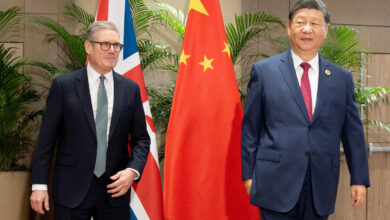
Victorious Labor leader Jeremy Corbyn's socialist agenda of nationalizations and high taxes is in sharp contrast to the free-market policies favored in Britain for decades, even by his own party.
The 66-year-old MP was elected by a landslide on Saturday, and has promised to fight government austerity, despite the Conservatives winning a surprise majority in May's general election.
"Austerity is actually a political choice that this government has taken and they're imposing it on the poorest and most vulnerable in our society," Corbyn said to trade union delegates on Tuesday.
Corbyn declared his intentions by appointing John McDonnell, a controversial far-left ally, as his shadow finance minister.
The shadow minister's appointment sparked immediate criticism, even from within Labor ranks and he has already become a favorite target of the right-wing media.
Return of the state
Corbyn and his finance spokesman aim to use a cocktail of interventionist policies — already called "Corbynomics" — to roll back the government's policies to boost free enterprise and shrink the state.
He said welfare cuts "have had disastrous, appalling consequences" and had "the effect of socially cleansing many parts of our towns and cities".
The pair advocate establishing a national investment bank to help develop innovative industries and to finance infrastructure programs worth billions of pounds.
Public funds would be boosted by taking more tax from the rich while the central Bank of England could lose its independence and be ordered to print more money in a "people's quantitative easing".
Corbyn also calls for the nationalization of certain industries, particularly the railway sector that was privatized in the early 1990s.
It was a decision that Labor did not reverse during more than a decade in power, and would be completely at odds with the current government and its belief in private ownership.
For the workers themselves, the new party leader wants an increase in the minimum wage and an end to "zero hour" contracts that allow companies to hire people with no guarantee of minimum hours.
Goodbye New Labor
Corbyn's program contrasts with former leader Ed Miliband and his claims to be "pro-business".
It is also a clean break from the era of "New Labor" — the centrist platform that catapulted Tony Blair into power in 1997 and which was developed by Gordon Brown when he took over in 2007.
"Ed Miliband had moved Labor to the left from Gordon Brown's days (contributing to the size of Labor's defeat), and Corbyn will provide cause for a further leap left," Erik Nielsen, chief economist at Unicredit, wrote in a note to clients.
Unsurprisingly, employers have shown little enthusiasm at Corbyn's triumph, even if his policies have little chance of being implemented soon.
The Financial Times reacted to Corbyn's election with an editorial calling it a "disastrous choice".
Corbyn is odds on not to be Labor leader when the next election comes around in five years' time, and even if he is, the party is long odds to defeat the Conservatives.
"From renationalizing the railways, to raising taxes on businesses and increasing government spending, Mr Corbyn has proposed some policies in the leadership campaign that we believe would undermine our open and competitive economy," said Simon Walker, director general at the Institute of Directors.
One area of particular concern is Corbyn's ambiguous relationship with the European Union, which the business community is largely in favor of.
Corbyn dislikes the bloc's free-market policies and has not ruled out campaigning for Britain to exit the union during the in-out referendum promised by Cameron before the end of 2017.
Cameron went further, suggesting that Corbyn posed a risk to the fabric of British society.
"The Labor Party is now a threat to our national security, our economic security and your family's security," he wrote on Twitter.




